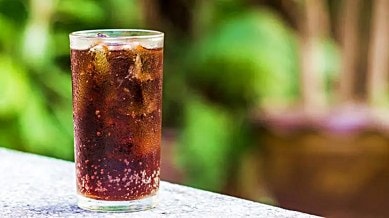Is diet soda harming your liver? A doctor decodes a new study
Dr Alokit Gulati, HOD Gastroenterology and Hepatology, Primus Super Speciality Hospital, explains how that zero calorie soda impacts your liver health and more.

If you thought that you are making a safe choice with diet soda and can drink it at will, think again. A new study, published in BMC Public Health, says that the heavy consumption of diet soda may raise the risk of non-alcoholic fatty liver or what has been now reclassified as metabolic dysfunction-associated steatotic liver disease (MASLD). While earlier studies have linked diet soda consumption to higher BMI and blood pressure, this one traces its impact on the liver and is largely linked to the fattening impact of artificial sweeteners in zero calorie drinks.
According to Dr Alokit Gulati, HOD Gastroenterology and Hepatology, Primus Super Speciality Hospital, the excessive intake of artificial sweeteners found in diet soda promotes insulin resistance and weight gain, which can lead to fatty deposits in the liver. However, clinical trials are needed to further study this possible association.
monthly limit of free stories.
with an Express account.
What makes diet soda unhealthy?
Diet soda is often considered unhealthy due to the artificial sweeteners it contains, such as aspartame and sucralose. These sweeteners have been linked to various health concerns, including metabolic dysfunction, altered gut microbiota and potential negative effects on cardiovascular health. Additionally, the acidity of diet sodas can harm tooth enamel and may contribute to other health issues. Even WHO has put an alert on artificial sweeteners.
Can diet soda cause liver problems?
The liver plays a crucial role in metabolising various substances, including sugar and artificial sweeteners. The introduction of these sweeteners may lead to metabolic confusion, potentially contributing to liver dysfunction over time.
The understanding goes that the hidden calories with excess use of diet soda means that extra fat can build up in your liver cells. As a result, your liver may get inflamed and over time, the swelling can harden and form scar tissue, which is called cirrhosis. You are more likely to get fatty liver if you are overweight or obese, middle-aged or have diabetes. You may be able to turn things around. Diet and exercise can stop the disease.
A study by the University of Barcelona found that even small doses of aspartame caused the chemical formaldehyde to accumulate in the liver and bind to protein molecules. For a long time, all soft drink majors used the preservative sodium benzoate, also known as E211. Now major brands have stopped its use after reports that it damages liver cells. One doesn’t know if the unregulated soda market is still using them or not.
How much diet soda can one drink in a day?
While there is no universally defined limit for diet soda consumption, moderation is the key. Excessive intake of artificial sweeteners and other compounds in diet soda may have negative health effects. It’s advisable to limit consumption and prioritise water or other healthier beverage options.